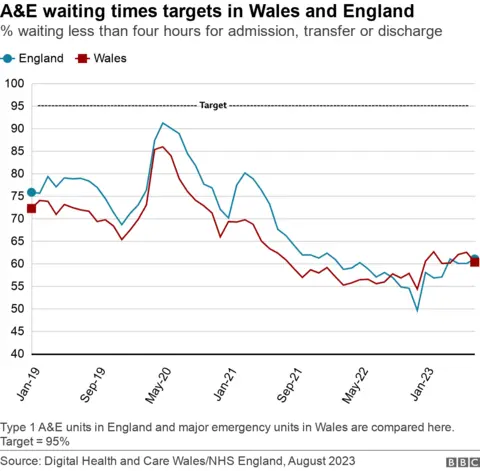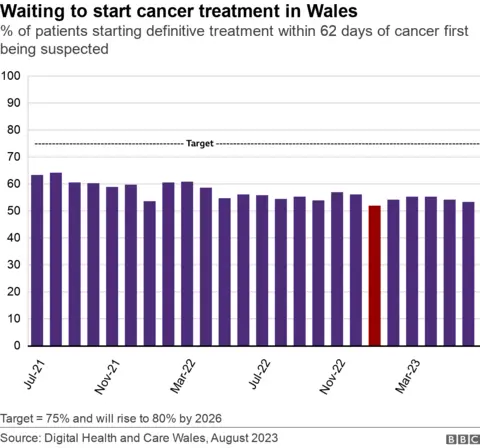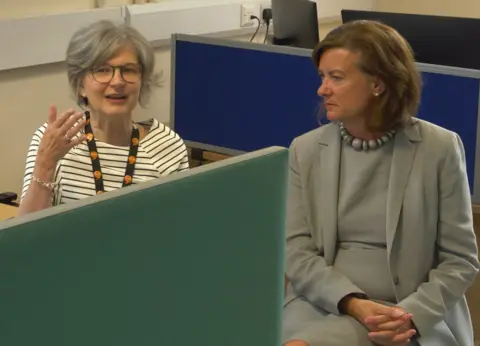NHS Wales waiting lists second highest on record
 Getty Images
Getty ImagesWaiting lists for hospital treatment in Wales are the second highest on record, latest figures show.
There were 754,271 patient pathways on the list in June, a rise for a fourth consecutive month.
This is more than 5,800 up on the month before and only about 400 short of the peak seen in September last year.
The health minister said it was "encouraging" to see progress on reducing some of the longest waits.
Meanwhile, ambulance response times and A&E waits have got worse, with emergency doctors warning that it was "deeply worrying" for the time of year.
In addition, only about half of people suspected of having cancer saw treatment starting within the target time.
There were 132,616 waits for hospital treatment of more than a year - or 17.6% of the whole list.
This is the tenth successive month these long waits have fallen.
There were also 28,331 still waiting more than two years, although this was the lowest monthly total since September 2021.
To make a comparison with England, we have to adjust the Welsh figures to only count consultant-led specialisms.
When these are compared, then we can see 19.5% were waiting more than a year on the list in Wales, compared with 5.1% in England.
There are also 4.2% waiting more than two years in Wales - but this is hardly any in England, 0.004% or only 314 patients.
When we look further to compare a region of England which has similar health and economic characteristics to Wales - the north-east and Cumbria - then the nine health boards in this area are doing better on the longest waits than both Wales and England as a whole.
Health Minister Eluned Morgan said the NHS was doing it all it could under challenges.
"We've seen the longest waiters coming down month after month, so things are improving, but there are lots of people still coming on to those waiting lists, week after week," she told BBC Wales.
Because some people are on more than one waiting list and counted more than once, it's estimated that there are 589,000 actual patients on the waiting list.
This has risen by 5,200 since the previous month.

What else are the figures telling us?
Ambulance response times were slightly worse than last month, with 52.6% of the most life-threatening "red" calls arriving within the eight-minute target time.
The average response time to red calls was seven minutes 38 seconds - 22 seconds slower than the previous month.
But handover delays - the time ambulances spent outside hospitals waiting to unload patients - are improving.
There were a combined 13,868 hours spent outside A&E units beyond the 15-minute target window, but this is the lowest for nearly two years.
'Dangerous overcrowding'
In accident and emergency, 70.7% of people were seen within four hours - a lower proportion than last month.
There were also 9,189 people who waited more than 12 hours, with the target that no-one should wait that long.
On average, people waited two hours and 39 minutes in July, just over two minutes slower than the previous month, and almost back to pre-pandemic levels.
For those aged over 85, the A&E wait was nearly five and a half hours on average.
Wales - when major emergency units are compared with England - is also doing slightly worse than in England for the four-hour target.
Dr Suresh Pillai, vice president of the Royal College of Emergency Medicine Wales, said despite fewer people attending emergency units, more patients waited longer in major A&Es in Wales in July.
"This is deeply worrying for this time of year as the summer months are traditionally considered 'quieter'," he said.
"We are almost in September, and effective winter planning must be put in place to ensure we are fully prepared as the colder months loom.
"This must focus on discharging those people who are well enough to leave hospital to free up beds and help to reduce dangerous overcrowding and delays in A&Es."
Figures also out on Thursday showed there were 1,500 patients in hospital beds in Wales, mostly elderly, ready to be discharged but waiting for care packages and residential home places to become available, due to delayed transfer of care.
For outpatients, there is a target that no-one should wait more than a year for a first appointment.
There are still 49,900 waiting that long, although numbers fell for the tenth month in a row and by 4.7% on the previous month.

For cancer treatment, barely half of patients (53.4%) suspected to have cancer saw their treatment start within the 62-day target.
That is the second lowest proportion since the target was introduced two years ago.
Macmillan, the cancer charity, said the system was "failing people diagnosed with cancer" and called for urgent action.
Stopping last-minute cancellations
The latest figures come as the health minister launched a "waiting well" policy, aimed at reducing 6,350 last-minute cancellations of operations in the past year.
Three-quarters of the late cancellations were because the patients said they were unfit for the procedure.
Trialled in the Hywel Dda health board, those on a waiting list will eventually be given a single point of contact to advise on better management of their symptoms and help people prepare for treatment, including exercise classes and dietary advice.
It will also give advice on where they are on the waiting list.
The policy is expected to be rolled out across the whole of Wales by the start of next summer.
 Welsh government
Welsh governmentMs Morgan said it would "empower people" to take responsibility for their own health and better self-manage symptoms while on waiting lists.
"Last minute cancellations mean wasted resources - it's a loss of consultant and surgeon time when that space could have been offered to someone else," she said.

Pamela Blake, 69, has osteoarthritis and is waiting for hip and knee operations.
But she has been taking part in a virtual exercise class from her home in Llanelli, Carmarthenshire, for nearly two months for when she eventually gets the go-ahead.
"I've been on the waiting list now for just over three years for my hip and obviously, it gets more and more painful," she said.
"You end up believing that you are the only one in the world that's got this problem."
Joining the Hywel Dda "waiting well" scheme has helped Pamela keep an eye on her health, as well as being in touch with other patients in a similar position.
"They'd found out that I had high blood pressure, which is now being monitored on a daily basis, but also on a fortnightly basis through the GP," she added.
"So I would've ended up, basically, having a pre-op referral and been told I couldn't have the operation."
Mandy Rayani, Hywel Dda's director of nursing, said staff helped support patients to ensure that they were ready for their treatment when the time comes.
"The service is aimed at ensuring that patients are fit and ready, supported while they wait, and help us to minimise the number of procedures that need to be cancelled and rescheduled due to patients worsening health conditions," she said.
What's been the response?
The NHS Confederation in Wales, which represents health boards, said it was disappointed at the slight increase to the number of patients on waiting lists.
"We therefore welcome the recently published three-year strategy and action plan to transform planned care, with the emphasis on providing support and information to people who have been referred for treatment," said Darren Hughes.
Prof Jon Barry, director in Wales at the Royal College of Surgeons, called for a focus on filling vacancies and retaining staff.
"Frustratingly, waiting lists in Wales continue to rise," he said. "It is a huge disappointment to healthcare staff as they are working incredibly hard to get patients seen and treated quickly."
Russell George, Conservative health spokesman, called the reduction in two-year waiting times "unforgivably slow" and called the Welsh government's record on cancer treatment "abysmal".
"I was particularly disappointed to see that despite a fall in footfall in emergency departments, four-hour and 12-hour target waits for A&E have worsened," he added.

Enter a postcode to find out what is happening in your area with A&E, ambulances and hospital waiting lists across the UK.

- MYFANWY HAYCOCK: Jenni is on a mission to revive the legacy
- ALL THINGS CONSIDERED: Oppenheimer and the Bomb

